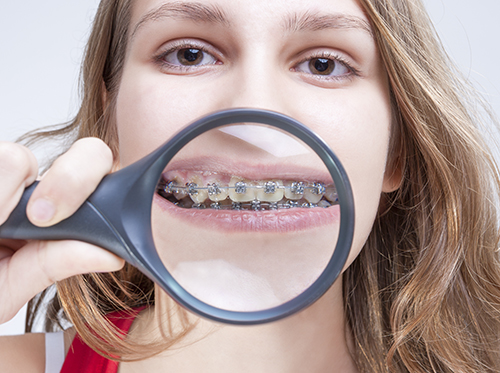September 6th, 2023

School can present a few issues when it comes to caring for your braces and mouth, since you won't have the luxury of the time and tools you have at your disposal while you're at home. But if you head to school prepared, you shouldn't have any trouble keeping your braces and mouth in great shape. Below is a list of helpful tips to care for your braces throughout the entire school year.
- Bring a kit that includes all of your oral health care items. This is a seriously smart thing to do and probably the most important of all the tips. Pack things like a toothbrush, floss, wax, retainer case (if needed), a mirror, a small cup for rinsing, a small bottle of water (if you don't already have some water with you), and some OTC pain medicine or a natural pain remedy. Keep the kit in your locker or backpack. Having all these items on hand will save you a lot of trouble and discomfort, and also ensure you don't have anything unsightly stuck in your braces or teeth!
- Take advantage of breaks and lunchtime. After eating lunch is a great time to pop into the restroom and give your braces and teeth a once over to make sure you don't have any food debris caught in them and to tend to any sore spots. If you've just had your braces adjusted, you may have soreness on your gums or cheeks. This is where the wax you packed will come in handy.
- Eat the right food for your braces. Avoid all the foods that wreak havoc on your braces like gum, candy, popcorn, hard chips, apples which aren't cut into wedges, nuts, beef jerky, ice, etc. You know the foods we're talking about; you've heard it enough already. Steering clear of these foods will help you prevent any possible mishaps with your braces, like breaking a bracket or wire, which is the last thing you want happening at school.
If you follow these tips and also keep up on your oral health routine at home, you'll be maximizing the effectiveness of your braces and making them as comfortable as possible. Do you have questions about caring for your braces during the school day? Ask Dr. Frech or anyone in our Wichita Falls, TX office and we'll gladly help you out!
September 6th, 2023

It's the end of summer, and fall is just around the corner. Soon the temperatures will cool down, the leaves will start to change, and Dr. Frech and our team at Wichita Falls Orthodontics are sure that you’ll soon be thinking about Halloween costumes and Thanksgiving plans in no time. But wait! First, we want to know about your favorite parts of the summer! Did you go on a wonderful family trip? Did you pick up a new hobby? Did you try to spend as much time outside and in the sun as possible?
Share your favorite memories, stories, or photos with us by leaving a comment below or on our Facebook page.
August 30th, 2023

Labor Day is upon us, and that means the non-official end to summer. Before the kids head back to school and temperatures start to cool down, this is your last chance to barbeque in the beautiful Wichita Falls, TX community, head to the lake, and wear your favorite pair of white pants.
About Labor Day
Each year, Labor Day is celebrated on the first Monday of September. It is the one day of year Americans celebrate their achievements in work, which the US Department of Labor says has contributed to prosperity and well-being of America as a whole. Americans have been celebrating Labor Day since the 1880s, and today it is an official federal holiday.
Interesting Facts About Labor Day
- Every year, more than 30 million Americans travel over Labor Day weekend.
- Canada was the first to celebrate Labor Day, and the US soon followed.
- President Cleveland made Labor Day and official US holiday in 1894.
- Labor Day marks the beginning of the NFL and NCAA sports seasons for fans.
- Labor Day marks the end of hot dog season, when Americans consume seven billion hot dogs.
Thanks for being a valued patient of our orthodontic office. Our staff would like to wish you a safe and happy Labor Day weekend. Enjoy your time off!
August 30th, 2023

Labor Day, celebrated on the first Monday each September here in the United States, is a holiday devoted to the American working community. The purpose of the holiday is honoring the country's workers and their contributions to the strength of our country as a whole.
How Labor Day Started
There is actually some debate as to the origins of Labor Day. It is uncertain whether Peter McGuire, a cofounder for the American Federation of Labor, or Matthew Maguire, who was the secretary of Central Labor Union of New York, had the great idea. However, the Central Labor Union's plans were what launched the first Labor Day in America.
The First Labor Day
The very first Labor Day was celebrated on September 5th, 1882. The Central Labor Union then held annual celebrations on September 5th for what they called a working man's holiday. By the year 1885, the Labor Day celebration had spread to many different industrial areas, and after that it began spreading to all industries in the United States.
Labor Day Today
Labor Day today is a huge United States holiday during which we honor the country's workers with a day of rest and relaxation or a day of picnics and parades. This holiday is truly one to honor the many people who work hard to contribute to the economic well-being of our great country!
Our team at Wichita Falls Orthodontics hopes all of our patients celebrate Labor Day, and every holiday, safely and happily. Whether you stay in the Wichita Falls, TX area, or travel out of town, have fun, and don't forget to brush!





